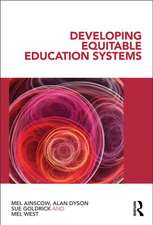The Changing Epistemic Governance of European Education: The Fabrication of the Homo Academicus Europeanus?: Educational Governance Research, cartea 3
Autor Romuald Normanden Limba Engleză Hardback – 27 iun 2016
Knowledge is power. It is materialized in metrics, policy instruments and embedded in networks. The governance of European higher education, insightfully argues Romuald Normand, is not structured by hierarchical public policies, by governmental exercise of authority or heroic decision making. Normand makes a sophisticated intellectual argument, building upon the work of Foucault, Latour (Sociology of science), and the pragmatic sociology of Boltanski and Thévenot (sociology of justification) in order to precisely analyse Europe‘s higher education through the circulation of ideas and instruments. Based upon precise research, the book is a major contribution to the understanding of high education in a capitalist Europe, beyond the simple idea of neo liberalism. Normand, provocatively, even suggests the making of a European Homo Academicus. This is an innovative and important book for publicpolicy, European Studies and the sociology of Education.
Patrick le Galès, FBA, CNRS Research Professor, Centre d’Etudes Européennes, Sciences Po, Paris, France
| Toate formatele și edițiile | Preț | Express |
|---|---|---|
| Paperback (1) | 385.62 lei 6-8 săpt. | |
| Springer International Publishing – 31 mai 2018 | 385.62 lei 6-8 săpt. | |
| Hardback (1) | 392.97 lei 6-8 săpt. | |
| Springer International Publishing – 27 iun 2016 | 392.97 lei 6-8 săpt. |
Din seria Educational Governance Research
- 24%
 Preț: 680.66 lei
Preț: 680.66 lei - 20%
 Preț: 553.85 lei
Preț: 553.85 lei -
 Preț: 304.59 lei
Preț: 304.59 lei - 18%
 Preț: 941.05 lei
Preț: 941.05 lei - 24%
 Preț: 749.04 lei
Preț: 749.04 lei -
 Preț: 305.98 lei
Preț: 305.98 lei - 18%
 Preț: 732.70 lei
Preț: 732.70 lei - 18%
 Preț: 892.90 lei
Preț: 892.90 lei - 15%
 Preț: 641.38 lei
Preț: 641.38 lei -
 Preț: 389.88 lei
Preț: 389.88 lei - 18%
 Preț: 947.85 lei
Preț: 947.85 lei -
 Preț: 379.48 lei
Preț: 379.48 lei - 18%
 Preț: 1006.24 lei
Preț: 1006.24 lei - 18%
 Preț: 785.86 lei
Preț: 785.86 lei - 24%
 Preț: 832.93 lei
Preț: 832.93 lei - 24%
 Preț: 682.78 lei
Preț: 682.78 lei - 15%
 Preț: 637.59 lei
Preț: 637.59 lei - 15%
 Preț: 649.54 lei
Preț: 649.54 lei -
 Preț: 388.52 lei
Preț: 388.52 lei -
 Preț: 440.39 lei
Preț: 440.39 lei - 15%
 Preț: 700.94 lei
Preț: 700.94 lei - 15%
 Preț: 703.06 lei
Preț: 703.06 lei - 15%
 Preț: 587.53 lei
Preț: 587.53 lei
Preț: 392.97 lei
Nou
Puncte Express: 589
Preț estimativ în valută:
75.20€ • 78.87$ • 62.60£
75.20€ • 78.87$ • 62.60£
Carte tipărită la comandă
Livrare economică 01-15 aprilie
Preluare comenzi: 021 569.72.76
Specificații
ISBN-13: 9783319317748
ISBN-10: 3319317741
Pagini: 251
Ilustrații: XVI, 235 p.
Dimensiuni: 155 x 235 x 16 mm
Greutate: 0.53 kg
Ediția:1st ed. 2016
Editura: Springer International Publishing
Colecția Springer
Seria Educational Governance Research
Locul publicării:Cham, Switzerland
ISBN-10: 3319317741
Pagini: 251
Ilustrații: XVI, 235 p.
Dimensiuni: 155 x 235 x 16 mm
Greutate: 0.53 kg
Ediția:1st ed. 2016
Editura: Springer International Publishing
Colecția Springer
Seria Educational Governance Research
Locul publicării:Cham, Switzerland
Cuprins
References.- 1. An Epistemic Governance of European Education.- Introduction.- Globalisation and Regimes of Knowledge.- Policy Networks and Travelling Politics of PISA.- Transnationalisation of Knowledge and Evidence-Based Research Policy.- The Mode 2 of Knowledge Production: a European Research Agenda.- The European University and the Knowledge Triangle.- The Foundations of the European Epistemic Governance.- Conclusion.- References.- 2. The Politics of Standards and Quality.- The Politics of Standards: Objects, Metrics and Expertise.- The Knowledge Economy and the European space of Statistics.- Governing by Numbers: New Political Technologies.- Standards, Quality and Tools in Higher Education.- From Standardization to Normalization: the Fabrication of a new Agency.- Conclusion.- 3. “What works?” or the Shaping of the European Politics of Evidence.- Introduction.- The Social Epistemology of the Politics of Evidence.- Policy Travelling from Health to Education.- Political Technologies of the Welfare State.- The Great Debate and Controversy in Education.- The Globalization of Evidence-Based Policy Making.- Conclusion.- References.- 4. The Multiple Worlds of Expertise.- Introduction.- Understanding the Politics of European Expertise.- Expertise and Policy Learning in Interactive Contexts.- Reflexive Learning and Story Telling.- Epistemic Community or Expertise in the Mode 2.- Social Interactions and Instrumental Politics.- Learning in the Shadow of Hierarchy.- Conclusion.- References.- 5. The New Spirit of Managerialism.- Introduction.- The New Spirit of Global Academic Capitalism.- The Criticism and Trials against the Academic Profession.- Trajectories and Trends of New Public Management in Higher Education.- The Trials of Managerialism and Professionalism.- The Knowledge-based University: a New Academic Regime?.- Conventions at Work for a new Homo Academicus.- Conclusion.- 6. The Making of a New Homo Academicus?.- Introduction.- The Weakening of the Academic World’s Defences.- The Academic Institution’s New Discourses of Truth.- New Spaces at the Boundaries of Academia.- Principles of Justification and Potentialities for Criticism.- Trials and Criticism of Managerialism.- Agencies of the Self and Academic Subjectivities.- Conclusion.- References.- Conclusion.
Textul de pe ultima copertă
This book examines the transformations of epistemic governance in education, the way in which some actors are shaping new knowledge, and how that new knowledge impacts other actors in charge of implementing this knowledge in the context of the decision-making process and practice. The book describes knowledge-based and evidence-based technologies that produce new modes of representation, cognitive categories, and value-based judgements which determine and guide actions and interactions between researchers, experts and policy-makers. It explores several major social theories and concepts, analysing the transformation of the relationship between educational and social sciences and politics. In the light of epistemic governance being linked to transformations of academic capitalism, the book describes the ways in which academics engaged in heterogeneous networks are capable of developing new interactions as well as facing new trials imposed on them by the changing conditions of producing knowledge in their scientific community and within their institutions.
Knowledge is power. It is materialized in metrics, policy instruments and embedded in networks. The governance of European higher education, insightfully argues Romuald Normand, is not structured by hierarchical public policies, by governmental exercise of authority or heroic decision making. Normand makes a sophisticated intellectual argument, building upon the work of Foucault, Latour (Sociology of science), and the pragmatic sociology of Boltanski and Thévenot (sociology of justification) in order to precisely analyse Europe‘s higher education through the circulation of ideas and instruments. Based upon precise research, the book is a major contribution to the understanding of high education in a capitalist Europe, beyond the simple idea of neo liberalism. Normand, provocatively, evensuggests the making of a European Homo Academicus. This is an innovative and important book for public policy, European Studies and the sociology of Education.
Patrick le Galès, FBA, CNRS Research Professor, Centre d’Etudes Européennes, Sciences Po, Paris, France
Caracteristici
Pictures the possible future of educational research Shows the complex dimensions of the new academic work Characterizes the new landscape of expertise and entrepreneurship in academia















